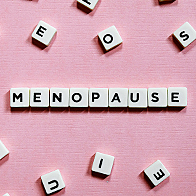Understanding Menopausal Brain Fog

Women undergoing menopause report a variety of menopausal "markers" or symptoms, including hot flashes, difficulty sleeping, mood swings, vaginal dryness—and cognitive difficulties, or "brain fog."
The majority of research indicates this is a common issue for women. The Seattle Midlife Women's Health Study found that 62 percent of women self-reported cognitive decline during their menopause transition (also known as perimenopause).
What is brain fog?
Brain fog, a commonly experienced menopausal symptom, can negatively impact women already struggling through major physical and mental difficulties. For many, the cognitive changes come in the form of forgetfulness.
"Most studies have found that this forgetfulness really boils down to verbal memory," explained Rachel Schroeder, a behavioral neuroscience researcher and Ph.D. candidate at the University of Iowa. "Women have trouble remembering everything on a list or struggle to come up with a word they're thinking about."
In the Study of Women's Health Across the Nation (SWAN), 42 percent of women going through menopause self-reported increased forgetfulness, said Schroeder. Most studies on menopause rely on self-reported data from participants, she explained, noting the irony of relying on the participants "to remember how forgetful they are."
The role of estrogen
As women enter perimenopause, their production of sexual hormones declines until their ovaries essentially stop creating estrogen and progesterone.
Estrogen, in particular, offers protection for brain cell health and the prevention of inflammation. When estrogen decreases, a woman's cortisol levels rise, which can lead to health complications.
"Cortisol is [a] male hormone," explained Laurie Cestnick, Ph.D., C.Psych., a U.S.- and Canada-based neuropsychologist and neuroscientist. "We have more of it when we lose estrogen/progesterone. There are many ideas as to why cortisol increases during perimenopause."
When cortisol levels rise, the body stops cortisol production and our autoimmune response kicks in, which is what leads to inflammation, said Cestnick. The swelling can result in constricted arteries, stopped blood flow, arthritis and cognitive dysfunction.
"We do not know exactly why we get more 'brain fog,' but there could be many reasons, [such as] inflammation reducing blood flow to [the] head" or our bodies initiating a fight-or-flight response, stated Cestnick. This restriction of blood flow due to low estrogen has also been linked to strokes and depressive symptoms.
Estrogen plays a vital role in providing energy for the body's cells. These energy producers are called mitochondria and are found inside each cell in the body. "Their function is to create energy," explained Schroeder, who referred to them as the "powerhouse of the cell."
"Nutrients from the food you eat get broken down in the gut and absorbed into the blood, eventually finding its way to the cells," continued Schroeder. "These nutrients can be sugars [or] fats, [which] the mitochondria [converts] to energy." Mitochondria convert sugars to energy through glycolysis, a process that uses estrogen.
Estrogen fluctuates daily during a woman's menstrual cycle, but the changes are slow, and the body adapts. However, during perimenopause, levels are unpredictable. "Mitochondria may use alternative processes to produce energy to avoid using estrogens," explained Schroeder, whose research looks at this process.
"This is good," she explained, "because we need to keep producing energy to survive, but this constant fluctuation may have long-term, damaging effects. Particularly, we think, in the brain, [which] uses a lot of energy."
Does HRT prevent cognitive decline?
When asked if hormone replacement therapy (HRT) helps prevent cognitive decline during the menopausal transition, Schroeder said, "This is the million-dollar question."
"What we have learned from researching the use of HRT is that there are a lot more factors involved than simply one's estrogen levels," said Schroeder. "Research has indicated that the age of the individual starting HRT is important, with women who start during perimenopause or early postmenopause having the best outcomes."
She suggested women check The North American Menopause Society's website for the latest guidelines on HRT.
Some research suggests that HRT can also lessen the risk of women developing Alzheimer's disease (AD) later in life. Schroeder cited the 2014 study of women who underwent the surgical removal of both ovaries, which resulted in "immediate loss of estrogens and decreased cognitive function and increased risk for developing AD." The participants were treated with a short-term protocol of HRT with positive results.
However, HRT has been linked to an increase in blood clots in the legs and lungs. Because of these findings, it's recommended that HRT be used as a short-term treatment option (less than five years) for menopausal symptoms. But experts agree that for many healthy menopausal women, the benefits of HRT outweigh the health risks.
Schroeder also noted that there are "indications that if you follow women long enough into the postmenopause [stage], their memory ability may rebound." Schroeder and other researchers theorize that after a time, women's bodies naturally adjust to the lack of ovarian hormones.
Your cognitive health, holistically speaking
Our brains (and bodies) benefit from maintaining a healthy lifestyle, and during menopause, this is especially important. Cortisol levels can be lowered by reducing stress, getting out into nature and incorporating mindful practices. A healthy diet helps maintain a healthy brain. Think fruits, vegetables, healthy fats and carbs, including vitamin-rich legumes and sweet potatoes. Don't forget to include exercise. Whether you choose a Pilates or yoga class, a hike in the woods, a walk or run in your local park, a swim in the ocean or a fitness routine, your brain will thank you.
Lastly, Schroeder added that "remaining social with friends and family, and keeping [your] brain active with puzzles and conversation" all reinforce healthy brain cognition.




















